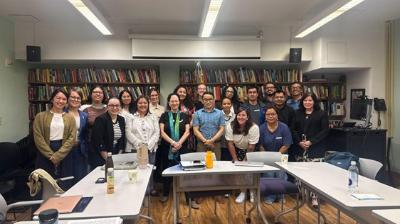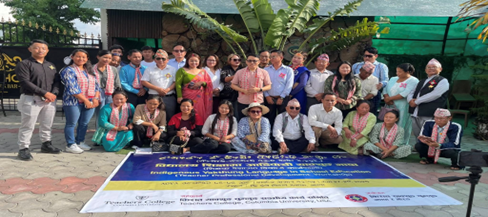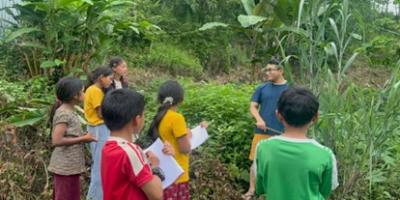This summer, Dr. Prem Phyak deepened his long-standing engagement with language policy, Indigenous education, linguistic justice, and community-based learning through a series of interconnected initiatives in Nepal and at Columbia University. His work demonstrated how educational research can inform policy, strengthen institutions, and empower communities.

At Columbia, Dr. Phyak helped lead the International Program on Indigenous Peoples’ Rights and Policy, a global initiative examining how Indigenous rights, ecology, and education intersect. His workshop, Linguistic Human Rights and Land-Based Education, encouraged participants to see language as more than a medium of communication. Instead, he framed it as a relationship to land, history, and collective identity; a foundation for designing educational systems that honor linguistic and cultural diversity.
In Nepal, Dr. Phyak collaborated with teachers, activists, and community leaders to strengthen Indigenous languages in schools. Partnering with Kirat Yakthung Chumlung, the national organization of the Yakthung peoples, he co-designed a residential teacher development program integrating the Yakthung language into classroom instruction. The training encouraged educators to draw on local stories, art, and land-based practices to make lessons more relevant to students’ lives. Yakthung language experts Amar Tumyang, Dilli Lingdam, and Purna Kumari Lingden co-facilitated the sessions, supporting teachers in creating materials that connect language learning with cultural heritage and environmental knowledge.

Alongside teacher development, Dr. Phyak led a community literacy and land project that brought together Indigenous youth and elders to document oral histories, songs, and stories tracing the relationships between language, memory, and place. The project emphasized how education grounded in local experiences and environments can preserve linguistic traditions while strengthening collective identity, intergenerational learning, and community resilience. Moreover, he facilitated stakeholders’ town hall meetings on designing a new post-graduate program on the Indigenous Yaakthung Language Education at the Kathmandu University School of Education, Nepal.
Parallel to these community collaborations, Dr. Phyak advanced his ongoing research on education reform and social inclusion, with a focus on multilingual education policy, in Nepal. One study investigates how teachers and activists interpret and enact multilingual education policies (Language Education Policy and Inequalities of Multilingualism in Nepal), while another examines how privatization affects equity and access (Modeling of Public Schools: Neoliberal Ideologies). By situating these inquiries within local teaching contexts, his research bridges national policy debates with everyday realities in classrooms.
Dr. Phyak also engaged in extensive public scholarship and international collaboration. He contributed two opinion pieces to national newspapers, participated in a radio and podcast series on decoloniality, multilingualism, and language policy 🎧 Listen here, and took part in a UN/IOM panel organized with Nepal’s Ministry of Foreign Affairs on “Engaging Nepali Diaspora Academics: Global Experiences and Opportunities.”
Taken together, Dr. Phyak’s summer initiatives highlight the tr ansformative power of education grounded in Indigenous knowledge and linguistic rights. By connecting research, policy, and community practice, his work reaffirms that inclusive and equitable education begins with honoring the languages, lands, and lived experiences that shape how people learn and belong.
ansformative power of education grounded in Indigenous knowledge and linguistic rights. By connecting research, policy, and community practice, his work reaffirms that inclusive and equitable education begins with honoring the languages, lands, and lived experiences that shape how people learn and belong.
